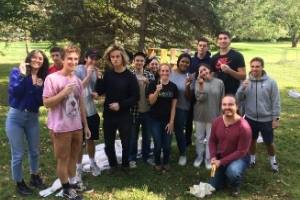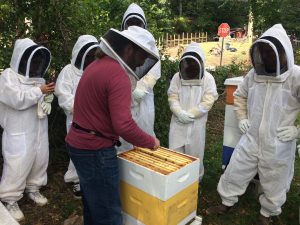
This past Wednesday I had the pleasure of sitting in on a brand-new College of the Environment class, ENVS282: Sustainable Agriculture and Food Systems. Taught by Dr. Rosemary Ostfeld ’10, the class focuses on the techniques and strategies that can be employed to make our farms and supply chains more sustainable, as well as exploring the effects of our consumption habits on the environment.
From left: Elizabeth Roff, Andres Arango, Harper Gambill, Randy Tyng, Mike Eustace, Kush Puri, Stephen Philipps, Kaitlyn McMullan, Rosemary Ostfeld, Deborah Eaddy, Samuel Peek, Olivia Weiss, Joe DeLollo, Drew Burnett, Leo Clibanoff, Noah Cohen.
Sustainable Agriculture and Food Systems serves not only to inform students about the environment, but also to take them outside the classroom to gain real-world skills and experience. In fact, at the beginning of the class I visited, a discussion of pollinators came hot on the heels of the previous week’s visit to a local apiary (read all about it on News@Wes). Check out the Q&A below for more about Ostfeld and ENVS282!
Where did the idea for the class come from?
My background is in Biology and Earth and Environmental Sciences, which I studied at Wesleyan University as an undergraduate and while doing my Masters. During my PhD at the University of Cambridge, I pursued interdisciplinary research in Land Economy, which is a combination of environmental science and public policy. It was at Cambridge where I really began to explore the impact our food and agricultural system has on the environment and strategies that can be implemented to mitigate those impacts. Our food and agricultural system is responsible for the vast majority of deforestation, freshwater consumption, and nearly a third of global greenhouse gas emissions. The impacts of our agriculture system can be reduced by changing production practices and also dietary consumption patterns. I wanted to teach this course to empower students on the choices they can make and also because this type of course was not available when I was a student.
How did you get involved with the environmentalist movement? Did your time at Wesleyan inspire you?
My parents have definitely played the largest role in shaping my interest and passion for environmental conservation. They showed me how important it is for people to be good stewards of the earth. I spent a lot of time outside when I was growing up and I live in a town where there are lots of farms. I think it’s really important to get kids interested in science and the environment at an early age. When I was 12 and took my first biology class I realized I loved learning about science. My interest in science evolved steadily from there. I loved being a student at Wesleyan so much that I did the BA/MA program. When the opportunity arose for me to teach here, I was thrilled.

What do you expect your students to take away from the class?
The class is very hands-on. Of course we spend time learning in the classroom, but I also like to integrate guest speakers over Skype and take the students on field trips. You can only learn so much from reading a book or listening to a lecture. Seeing and experiencing something first hand helps you understand at a much deeper level and also makes the learning experience far more memorable. In addition to time spent learning inside the classroom, the students have visited Long Lane Farm, learned about sustainable food sourcing at Wesleyan from Bon Appetit manager Mike Strumpf, and visited an apiary with Drew Burnett, a local beekeeper. We also have upcoming field trips to Four Root Farm, an organic farm founded by Wesleyan alumni, Knox Hartford which works on urban agriculture initiatives, and to speak to the Connecticut Department of Agriculture Commissioner.
I want students to gain an understanding of what sustainable agricultural practices look like, and the changes they can make to their diet to minimize impacts on the environment. If a student decides to start a farm, that would be a great outcome. But that’s not the only way students can have a positive impact within our food and agricultural system. There are paths for students to not only be farmers, but also scientists, science communicators, policymakers… People also have the opportunity to have a positive impact on the environment every time they eat a meal based on the food choices they make.